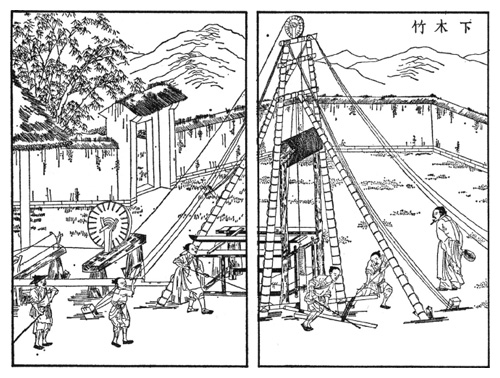
This Article From Issue
September-October 2010
Volume 98, Number 5
Page 434
DOI: 10.1511/2010.86.434
NATURAL EXPERIMENTS OF HISTORY. Edited by Jared Diamond and James A. Robinson. viii + 278 pp. The Belknap Press of Harvard University Press, 2010. $29.95.
WHY AMERICA IS NOT A NEW ROME. Vaclav Smil. xii + 226 pp. The MIT Press, 2010. $24.95.
Natural Experiments of History and Why America Is Not a New Rome are concerned with comparisons, and with how—and how not—to make them. In the latter book, Vaclav Smil, the Czech-Canadian geographer and polymath, takes umbrage at the blithe comparisons that are often made between the modern United States and ancient Rome; he tries to convince readers that these are for the most part specious and ill-founded, because the differences between the two societies are so vast. In Natural Experiments of History, the book’s contributors and its editors, Jared Diamond and James A. Robinson, find the standard arguments for causation made by historians to be unsystematic and impressionistic. Arguing for more rigor in such analyses, they advocate the use of natural experiments and statistical methods.

From Why America Is Not a New Rome.
Diamond and Robinson hope that scholars concerned with history will be on the lookout for natural experiments that lend themselves to more careful study of causation than historians typically prefer. No one can step back into history and change things, so controlled experiments of the sort that are routine in chemistry, physics and parts of biology remain out of reach. But now and again history happens to present opportunities in which, for example, two (or ideally more) societies that greatly resemble one another are in one case perturbed by some variable and in the other case not, and their subsequent histories diverge. Or societies with divergent initial conditions are perturbed by the same variable, and their subsequent histories converge. For instance, in 1950 North and South Korea were perhaps very much alike. Then geopolitics intervened and one was subsequently governed very differently from the other, and their economic fortunes followed quite different paths. One might reasonably conclude that their systems of government were responsible for their contrasting economic fortunes. This is the simple version, and few of those exist in something as notoriously untidy as human history.
The case studies in the book range from contemporary societies that keep written records from which abundant information can be obtained to nonliterate past societies that we know about only from archaeological excavations; geographically, they encompass many parts of the world, from tropical Africa to regions of Germany.
Patrick Kirch contends that methods of historical anthropology that borrow something from genetics and linguistics can help us understand why three different places that were all colonized by the early Polynesians and had similar cultures when first occupied—Mangaia, the Marquesas and Hawaii—have evolved so as to feature notably different political formats a few centuries later. The reason seems to lie mainly in their geography.
James Belich, the lone card-carrying historian in the book, examines what he calls “exploding Wests”—meaning rapidly developing frontiers of white settlement in the 19th century—in North America, Australia and New Zealand, with sidelong glances at Siberia and Argentina. Belich finds similar rhythms of boom and bust in them all, and broadly similar explanations for this pattern. His chapter lacks the statistical approach that is employed in the other chapters, and in methodological terms it is the most conventional as history. But it bristles with insight and is written with verve.
Stephen Haber explores the role of institutions and political culture in producing notably different banking systems in Brazil, Mexico and the United States. Then Diamond revisits the comparisons between Haiti and the Dominican Republic, and among scores of Pacific islands, that he made a few years ago in his book Collapse, in which he also recommended the pursuit of natural experiments. Nathan Nunn, an economist, tries to show that the intensity of the slave trade in Africa over several centuries largely explains today’s poverty on that continent and the geographic distribution of that poverty. Abhijit Banerjee and Lakshmi Iyer offer an explanation of the currently divergent fortunes of various parts of India based on their differing experiences of British rule. Daron Acemoglu and coauthors seek to explain the geography of economic development within 19th-century Germany by noting which regions Napoleon’s troops occupied (and reformed) and which regions his army left alone. Kirch and Belich aside, the main goal in these chapters is to explain economic history, especially why some places are rich and some are poor—the question Diamond addressed in his 1997 book Guns, Germs, and Steel.
Many historians would reject these analyses, citing confounding variables and rival explanations. I found myself wondering, with respect to German economic history, whether it might just be that Napoleon accidentally chose to occupy parts of Germany that had lots of easily accessible coal and were well served by the transport highway of the Rhine river, and would therefore show faster economic growth after industrialization began around 1850. And it occurs to me that Nunn’s arguments about the salience of the slave trade would have looked much less plausible in 1960, when Ghana and Nigeria (countries from which many people were sold into slavery) were among the richer parts of Africa.
But neither historians nor anyone else should harrumph at the methodological suggestions in this book. Historians like to make comparisons but have no clear methods for doing so. Natural experiments, although never as clear cut as well-designed ones in the laboratory, do offer insight and opportunities for stronger statements about causation than historians (and archaeologists) typically provide.
The editors write that the book is targeted at undergraduates as well as scholars. Undergraduates are likely to be at least as open to methodological experimentation as their elders. But few will have the patience to slog through the prose of most of these chapters. They can get the gist of the book’s contribution from the prologue and afterword, which bear the stamp of Diamond’s talent for simplicity and clarity.
In Why America Is Not a New Rome, Smil, for his part, aims to debunk a single, if commonplace, comparison that he finds lacks rigor. As he notes, breezy analogies between ancient Rome (sometimes the Republic, sometimes the Empire) and the United States seem especially popular these days, albeit more among journalists than among scholars. Very few people today have the classical education needed to appreciate the complexities of ancient Rome. Smil, not at all abashed about displaying what appears to be a solid command of Latin, wants to show that in many respects the comparison is absurd, even if on some levels it is useful.
To this end he offers the following sets of arguments. First, the terms in which the comparison is normally cast are factually erroneous. The United States is not an empire, properly speaking, whereas Rome (even for much of its Republican period) most certainly was one. The United States does not rule the world, and indeed its power today is largely illusory, clearly slipping and surely ephemeral. It has not been able to impose its will, or even win most of its wars, since 1945. Rome did not rule the “known world” even at the height of its empire. Romans knew about other large and powerful states in Persia, northern India and to a limited extent even China.
Second, in the most fundamental of matters ancient Rome and modern America are dramatically different. The United States is a far more innovative society and uses vastly greater quantities of energy than were needed in ancient Rome. Roman life expectancy was much shorter, Romans were far poorer, and economic inequality in ancient Rome was far greater. Here Smil is on firm ground, and in his discussions of energy, it is ground very familiar to him, as he has written several valuable books on energy and society. These matters of energy, economy and demography are fundamental, Smil insists, and vitiate almost all comparison between ancient Rome and the United States. This argument, which I accept fully, of course also vitiates comparisons (on these material variables) between all ancient societies and modern industrial ones.
Smil does not venture deeply into the swampier terrain of analogies based on unquantifiable matters such as public morality, civic virtue and so forth. Such matters usually feature prominently in Rome–America comparisons, especially when authors aim to show that contemporary Americans lack virtue and are therefore heading for a fall. Instead of providing quantitative data to show how different Rome and America are, Smil instead points out, again quite rightly, that one can find manifestations of pervasive corruption, selfish elites, divisive chasms between civil and military sectors of society, and so forth almost anywhere one cares to look. These are not features particular to Rome and America. Nor are monumental architecture and sprawling road systems.
These two books will help anyone think more carefully about the business of comparison. It is an irresistible way of thinking. Indeed at root, all knowledge, all judgment, all evaluation is comparative. The great French medievalist Marc Bloch maintained that all history is implicitly comparative history. We can’t help making historical comparisons, yet we do not have a logical, accepted way to make them. Facile ones abound, partly because most of us are intellectually a bit lazy, and partly because (even if spurious) they can help convince one’s listeners or readers. Next time you hear a proposed political course of action described as “another Munich,” you might want to invite the speaker to have a look at one or both of these books.
J. R. McNeill is an environmental historian and University Professor at Georgetown University. His most recent book is Mosquito Empires: Ecology and War in the Greater Caribbean, 1620–1914 (Cambridge University Press).

American Scientist Comments and Discussion
To discuss our articles or comment on them, please share them and tag American Scientist on social media platforms. Here are links to our profiles on Twitter, Facebook, and LinkedIn.
If we re-share your post, we will moderate comments/discussion following our comments policy.